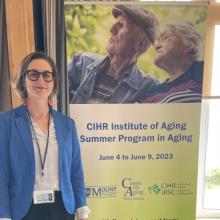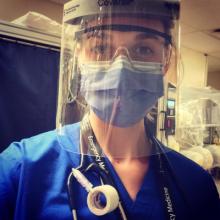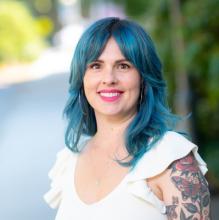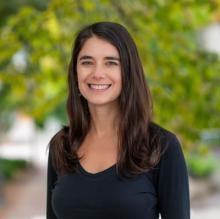I have purposefully sought out opportunities to create and circulate accessible and applicable knowledge using diverse methods involving knowledge users throughout the research process. Being a Public Scholar means that I will have the tools and support to be able to make my vision to create accessible practice-based knowledge a reality.
Research Description
The recent COVID-19 pandemic has tragically highlighted the need for reform in the Canadian long-term care sector in order to allow residents to experience quality of life. The purpose of my research is to identify how, why, and under what circumstances nursing care can improve quality of life for Canadian long-term care residents. I will identify the specific contexts and mechanisms where high quality nursing care positively influences resident quality of life. I plan to engage knowledge-users (those who end up using the study results in practice) throughout the realist knowledge synthesis and case study evaluation to produce key recommendations in diverse formats – a podcast, graphic recordings, infographics, journal articles – that will provide a roadmap to reforming nursing care to improve quality of life for Canadian long-term care residents.
What does being a Public Scholar mean to you?
I strive to embody the philosophies of public scholarship in every part of my research programme. My journey into research was fuelled by a passion to increase access to credible evidence-based information co-generated with knowledge users to improve nursing practice and quality of patient care. In my clinical work as a registered nurse (emergency department), I saw the disconnect between care that we provided, and the research advances I read about in journals articles. Since then, I have purposefully sought out opportunities to create and circulate accessible and applicable knowledge using diverse methods involving knowledge users throughout the research process. Being a Public Scholar means that I will have the tools and support to be able to make my vision to create accessible practice-based knowledge a reality.
In what ways do you think the PhD experience can be re-imagined with the Public Scholars Initiative?
The Public Scholars Initiative will allow me to purposefully allocate time, energy, and money to act on values that are frequently promoted yet infrequently financially supported by higher educational institutions. These values include engaging in collaborative research with knowledge-users, purposefully contributing to society, and producing non-scholarly research output that is accessible to those without access to (for example) scholarly publication databases. Allowing these values to be at the forefront of my PhD experience has the potential to deepen the meaning of my research, and give me a sense of fulfillment from working towards contributing to something ‘bigger’.
How do you envision connecting your PhD work with broader career possibilities?
My dissertation work will help to hone some key skills that will be required for building a future career (e.g., engaging in collaborative research, producing podcasts, and increasing societal impact of scholarly research). These are skills that not only will help me to expand my research programme but also will help to keep the focus on why I wanted to do research in the first place: to improve the health and well-being of patients, residents, and nurses through practice-driven research.
How does your research engage with the larger community and social partners?
The long-term care community will be heavily involved in this research. Throughout all phases of the research (the synthesis of existing knowledge, the evaluative case study, and the production of the podcast and journal articles) I will engage a group of people from various roles within long-term care in the form of an advisory panel that will meet regularly to consult on all aspects of the research project. The advisory panel will include a combination of individuals in long-term care leadership positions (e.g., neighbourhood/unit manager, educator, CEO), family members, researchers and/or measurement experts, residents, nurses and/or care aides, and members of the interdisciplinary care team (e.g., dietician, recreational therapy etc.). Most importantly, this group will provide input on the applicability and accessibility of the study results so that we can co-create actionable strategies to increase potential impact in practice.
Why did you decide to pursue a graduate degree?
Upon completion of my masters thesis, I knew that I was only at the beginning of my research journey. I had many more questions that I felt warranted attention in the healthcare world. I realized that a graduate degree would enable me to maximize my ability to find answers and impact a broader scope of healthcare practitioners, patients, and families.
Why did you choose to come to British Columbia and study at UBC?
I came to UBC because of my two co-supervisors and mentors, Dr. Maura MacPhee and Dr. Farinaz Havaei. I looked all across the country for nurse researchers who had done groundbreaking work in health research in my area of interest, and after only one phone call, I knew where I wanted to be for my PhD.
What is it specifically, that your program offers, that attracted you?
What attracted me to my program in particular was the personable and welcoming nature of the UBC School of Nursing world-class faculty. Right from the earliest interactions with my future supervisors, I felt as though I was respected as a nurse, as a novice researcher, and as a student, and I realized that I would be well-supported throughout the long journey that is a doctoral degree.
For you, what was the best surprise about graduate life, about UBC or life in Vancouver?
The first year of my PhD started in 2020. Due to the evolving pandemic, all of my first year classes were held online. Because of my part-time job as an emergency department nurse, my family and I decided to remain in Toronto. I worried that this would negatively affect my experiences at UBC, but was pleasantly surprised that I felt engaged and motivated by the classes, and was able to develop strong relationships with my cohort and faculty members alike. It made me feel as though I was close by even when I was 4500km away.
What do you see as your biggest challenge(s) in your future career?
I foresee my biggest challenge to be the slow pace of change in healthcare. Nurse researchers, especially those in long-term care, have been struggling to make changes to better our healthcare system for decades and often often encounter seemingly insurmountable barriers. I am hoping that the recent light the pandemic has shone on the fragile state of long-term care in our country will give some lasting fuel to the fire of change.
What aspects of your life or career before now have best prepared you for your UBC graduate program?
The graduate program at UBC is very multi-faceted and requires students to apply a wide variety of skills. I believe that my diverse life and career experiences (e.g., living in and traveling through various countries, working as an emergency department nurse in various urban and rural locations) along with my innate ability to organize and schedule, have helped to prepare me for graduate work. There is nothing a well-designed spreadsheet can't handle.
What do you like to do for fun or relaxation?
Being active and creative every single day helps me keep my brain balanced; cycling, playing hockey, cross country skiing, yoga in the park, playing guitar, running, etc. I also never start my day without a cup of tea with milk.
Do you have any tips for students from your home country coming to Canada / to UBC Grad School?
Don't underestimate the value of working as a research assistant. I learned just as much during my first year of my PhD program working as a research assistant as I did during the other aspect of my studies. It helped me make valuable connections in the field, gave me hands on experience, and forced me to practice skills that were less developed. The second piece of advice I have for new graduate students is to read anything non-fiction on your time off. Your brain needs to relax.






